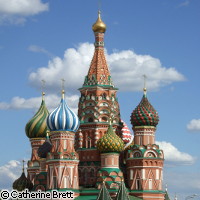EU-Russia research cooperation good but could be better, says report
EU-Russia cooperation works well and Russian partners' contribution to EU-funded projects is highly appreciated by EU partners. Nevertheless, much needs to be done to boost Russian participation in the EU framework programmes and to integrate them fully into the European Research Area (ERA). These are the main conclusions of a new report from the EU-funded RUSERA EXE ('Expanding ERA over Russia') project, which was funded to the tune of EUR 240,000 under the 'International cooperation' Activity area of the Sixth Framework Programme (FP6). The aim of the project was to boost EU-Russia research cooperation by creating and supporting links between individual researchers in the two regions. The report is based on a survey and interviews with researchers and other stakeholders involved in EU-Russia cooperation. The results highlight the high esteem in which Russian researchers are held by EU project coordinators, who praise Russian researchers' scientific competence and personal reliability, as well as their keenness to deliver top-quality research results. Furthermore, both EU and Russian researchers believe that the Russian contribution to research projects is 'essential'. However, the report uncovers a number of hurdles stymieing greater and better EU-Russia research collaboration. Language remains a serious problem; many EU respondents to the survey said they would have faced serious problems regularly if they had not had the help of Russian-speaking staff from their own institutions to help them. The hierarchical nature of most Russian research organisations also creates challenges; few researchers have the power to take decisions, and if a signature is required on a document, it usually has to go up a number of steps in the hierarchy. Moreover, a lack of funding on the Russian side also prevents many Russian partners from attending kick-off meetings in the EU. As a result of this fragmented orientation process, Russian researchers sometimes have a less than complete understanding of their role in the project and the tasks they are expected to carry out. On the project management side, the report found that Russian researchers lack project management skills as compared to their EU counterparts, and have gaps in their knowledge of the rules surrounding the framework programme. In particular, some EU researchers also complained that Russian research institutes do not have a culture of justifying expenditure, as is required in EU-funded projects. The report sets out a number of tips and measures to overcome these problems. For example, it calls for the further development of FP7 (Seventh Framework Programme) support structures in Russia, especially in the regions, to ensure that all researchers can easily find out about the EU's research programmes. More funding is needed to allow Russian researchers to travel to project meetings in the EU so that they can contribute more fully to the project's overall direction. At the same time, European researchers should visit Russia to establish good personal relationships with the scientists there. European researchers also need to be aware of the structure of Russian research institutions, and to see the scientists as mediators to a hierarchy that may have little experience of international research cooperation. Russian researchers would benefit from further developing their complementary skills, especially project management, language and wider communication. At the institutional level, EU funds need to be managed transparently and in line with EU rules. 'Within FP7, the European Community and Russia cooperate even more closely than in FP6, defining jointly RTD topics of mutual interest and benefit, offering specific instruments to encourage an intensified RTD cooperation,' the report concludes. 'It will be of major importance to develop a straightforward implementation strategy of measures necessary in order to enable Russia and Europe to fully exploit the high potential of EU-Russia RTD cooperation in the upcoming years, notably in case of Russia's association to FP7.' In his foreword to the report, Project Coordinator Professor Yuri Pokholkov of the Russian Association for Engineering Education wrote: 'I hope that the present report will be very helpful to researchers and research managers of both Russia and Europe, and will also be invaluably useful in the efficient and mutually beneficial international scientific and technological cooperation.'
Countries
Russia



